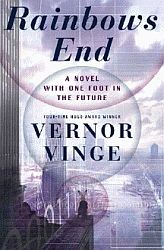Book Review:
Vernor Vinge,
Rainbows End
by Jerry Wright

|
|
Rainbows End
Author: Vernor VingePublisher: Tor Science Fiction Hardback: 368 pages ISBN: 0312856849 Price: $25.95 |
I first came upon Vernor Vinge with a novel called Grimm's World, later retitled Tatya Grimm's World about a planet of archipelagos where ships traveled from one end of the planet to the other carrying, among other things, a vast publishing industry of science fiction and fantasy. This was a fun novel in it's own right, but when I read 1981's novelette "True Names" about the dawn of the cyberspace age, I knew I was in the presence of a true innovator, and one who KNEW! And had SEEN THE GLORIES (or somesuch) about the age just in front of us.
So many writers writing about computers and telecommunication technologies really had no clue. And then I find out that Vinge IS a computer scientist. Wow!
Rainbows End (note the lack of the apostrophe!) is another fine foray into near future computing, along with life, the universe, and well, just everything. Based in the same universe as his award winning story "Fast Times At Fairmont High", Vinge shows us what could happen a short 20 or so years from now.
As I read the book, I couldn't help but wonder about those of us NOT steeped in technologies. Would they understand the dangers of a "Ya Gotta Believe Me" virus, wherein people would do and think things in a mind-numbed robot sort of way, and never realize they were under control. Would they understand the concept of "affiliances", the gathering together of affiliate-alliances for power, understanding, and control (as well as money...). How about the dystopian view of Big Brotherish Homeland Security requiring everyone to utilize "Secure Platform Technologies"; secure to everyone but those with access to the built-in backdoors, or skilled enough to just sneak in. And where datamining is obscured by groups of privacy concerns who fill the dataspaces with disinformation.
There is a lot to think about here. The framework, about a noted and vicious poet-laureate recovering from Alzheimers, which cure seems to have killed his genius with words, and how he learns to cope with this brave new massively networked, computerized world, is well done. Robert Gu, a Chinese-American, is willing to do almost ANYTHING to recover his lost abilities, and a "Mysterious Stranger" also known as "Mr. Rabbit" has promised just that. However, first he must go back to high school (really junior high school, to be technical) and learn to use and interface with the marvelous technologies now available.
There is so much more to this book... Robert's techno-genius granddaughter Miri, poor-side-of-the-tracks Juan, Robert Junior and his wife the JITT (Just In Time Training) damaged Alice. And many others.
By the way, if you've ever read John Brunner's Stand On Zanzibar you'll remember "eptification". Yep, similar concepts, and similar damage.
Anyway, this book really does have "One Foot In The Future", and the other in the grave. Even if you aren't a technoweeny, there is much in this book to enjoy, and it isn't quite the almost unbelieveable avalanche that was Charley Stross's Accelerando. If you are a technophile, you will say, "Oh wow..." and enjoy yourself through multiple depths of meaning and humor, and you will feel good at the end of the book.
Hugo material? I think so.
Copyright © 2006 Jerry Wright and Bewildering Stories

